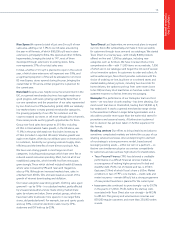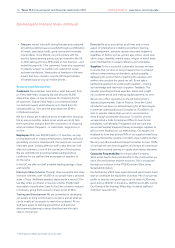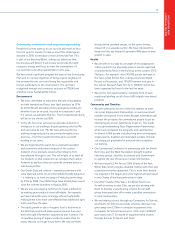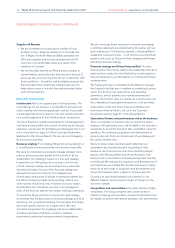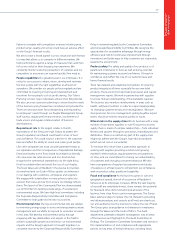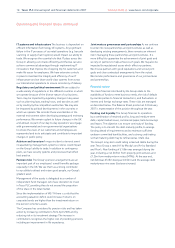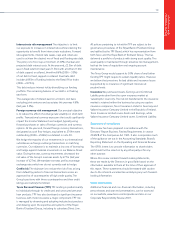Tesco 2007 Annual Report Download - page 25
Download and view the complete annual report
Please find page 25 of the 2007 Tesco annual report below. You can navigate through the pages in the report by either clicking on the pages listed below, or by using the keyword search tool below to find specific information within the annual report.
attendance also facilitates the communication of the
Committee’s decisions to the rest of the Group.
The Committee has authority for decision-making in all areas
except those set out in the Schedule of Matters Reserved for
Board Decision. The Executive Committee is responsible for
implementing Group strategy and policy, for monitoring the
performance of the business and reporting on these matters
in full to the Board.
The Executive Committee has also set up further operational
groups or boards aimed at implementing the key elements
of the Group’s strategic plan and managing its UK and
international operations, joint ventures, property acquisitions,
finance, funding and people matters. These groups are heavily
populated with Executive Directors and senior management
from relevant functions.
Nominations Committee The Nominations Committee leads
the process for Board appointments, re-election and succession
of Directors and the Chairman. The Committee is chaired by
Mr D E Reid and its members during the year were Mr C L Allen,
Mr R F Chase, Mrs K R Cook, Mr E M Davies, Dr H Einsmann,
Mr K J Hydon, Ms C McCall and Sir Terry Leahy. The Company
Secretary also attends in his capacity as Secretary of the
Committee. Where matters discussed relate to the Chairman,
the Senior Independent Non-executive Director chairs the
meeting. The Nominations Committee met once in the year
ended 24 February 2007 to discuss the ongoing shape and
capability of the Board. They fully consider succession plans for
Executive Directors and the senior executive level below the
Main Board. The Committee discussed in detail Miss L Neville-
Rolfe’s proposed appointment to the Board. The Committee
unanimously agreed that she should be appointed to the
Board as Director of Corporate and Legal Affairs and she will
submit herself for election at the next AGM. All Directors have
to submit themselves for re-election at least every three years if
they wish to continue serving and are considered by the Board
to be eligible. New Directors are submitted for election by
shareholders in their first year.
Remuneration Committee The Remuneration Committee’s
role is to determine and recommend to the Board the
remuneration of the Executive Directors. It monitors the levels
and structure of remuneration for senior management and
seeks to ensure that they are designed to attract, retain and
motivate the Executive Directors needed to run the Company
successfully. Mr C L Allen chairs the Committee, which is
composed entirely of independent Non-executive Directors.
Committee members for the year ended 24 February 2007
were Mr R F Chase, Mrs K R Cook, Mr E M Davies and
Dr H Einsmann. At the invitation of the Committee the
Chairman of the Board normally attends meetings. The
Company Secretary also attends in his capacity as Secretary
of the Committee. The responsibilities of the Remuneration
Committee and an explanation of how it applies the Directors’
remuneration principles of the Combined Code, are set out
in the Directors’ remuneration report on pages 27 to 40.
Audit Committee The Audit Committee’s primary
responsibilities are to review the financial statements, to review
the Group’s internal control and risk management systems,
to consider the appointment of the external auditors, their
independence and reports to the Committee, as well as to
review the programme of Internal Audit. The Committee’s
annual schedule includes a review of the effectiveness of
external and internal audit and a review of Protector Line, the
Company’s ‘whistle-blowing’ procedure. The Committee met
four times this year. Each year it conducts a review of the
Committee’s own effectiveness and its Terms of Reference.
Mr K J Hydon, who has recent and relevant financial
experience, is the Chairman of the Committee. The other
Committee members for the year ended 24 February 2007
were Mr R F Chase, Mr E M Davies and Ms C McCall. At the
invitation of the Committee, the Chairman of the Board, the
Finance Director and his representatives, the Internal Audit
Director, the Corporate and Legal Affairs Director, other relevant
Executive Directors and representatives of the external auditors
regularly attend meetings. The Company Secretary also attends
in his capacity as Secretary of the Committee. The Committee
has regular private meetings with the external auditors during
the year. The need for training is kept under review and the
annual agenda ensures time is dedicated to up-skilling
sessions which may be provided by external experts. This year
training was provided for the whole Committee on pensions
and asset impairment under IFRS. Training is also provided to
meet specific individual needs of committee members.
Board performance evaluation The Board regularly reviews
its own performance. During the year ended 24 February 2007,
the Board agreed that it would be appropriate to conduct an
in-house review. The Chairman met with each of the Directors
individually and reported to the Board on the findings of the
review. The Board found this to be an open, constructive and
useful process and the review concluded that the Board is
highly effective. The main areas of focus in the past year were:
meeting the continuing challenges of improving our capability
in terms of talent development, leadership skills and building
the process, systems and organisation for a fast-growing
international business.
The Chief Executive reviews the performance of each Executive
Director. The Chairman reviews the performance of the Chief
Executive and each Non-executive Director. During the year,
the Chairman met with the Non-executive Directors, without
the Executive Directors present, to discuss Board issues and
how to build the best possible team. The Senior Independent
Non-executive Director met with the Non-executive Directors
in the absence of Chairman, to assess the Chairman’s
effectiveness.
The Board scheduled eight meetings in the year ended
24 February 2007 and ad hoc meetings were also convened
to deal with urgent matters. The following table shows the
attendance of Directors at regular Board meetings and at
meetings of the Audit, Nominations and Remuneration
Committees during the year.
23
THE BOARD AND THEIR
RESPONSIBILITIES


